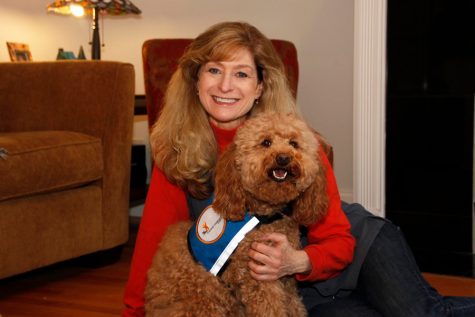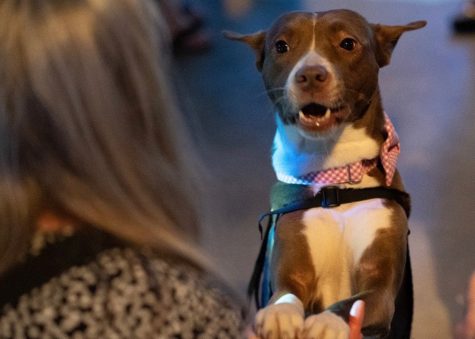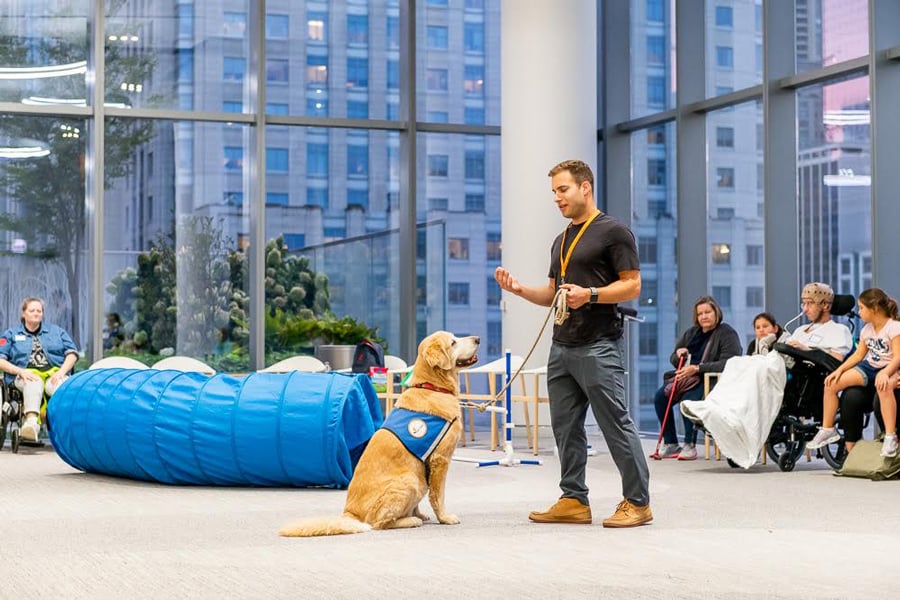Canine Therapy Corps supports Chicagoans with furry friends
Courtesy of Shirley Ryan AbilityLab
Canine Therapy Corps aims to use dogs to help people change their behavior in a healthy way. It hosts numerous programs at locations across the city, like at the Shirley Ryan AbilityLab.
January 14, 2020
Rosie, a six-year-old miniature poodle, loves people, treats and sleeping on her owner’s lap. But Rosie is also a certified therapy dog.
She and her owner, Alice St. Clair, volunteer with Canine Therapy Corps in Chicago. The pair visits Haymarket Center, a substance use program, once a week to work with people in treatment. St. Clair said it has been an “incredibly rewarding experience.”
“Many of the individuals at Haymarket meet Rosie and talk about how much they love dogs or miss their dogs,” St. Clair said. “It’s the highlight of their week and means the world to them.”

Alice St. Clair and her dog Rosie are volunteers at Canine Therapy Corps. They visit Haymarket Center every week to work with those recovering from substance use.
Canine Therapy Corps, a non-profit founded in 1991, uses dogs to help people change their behavior in a healthy way, said Ann Davidson, operations manager at the organization. About 60 dog teams — a dog and its handler — volunteer during the year. Canine Therapy Corps has its own test that the dogs must pass before joining.
Canine Therapy Corps specializes in what Davidson called “goal-directive programming.” Clients enrolled in the programs complete exercises with a therapy dog geared towards personal, physical or behavioral objectives.
“We don’t just help people feel better,” Davidson said. “We help people get better.”
Canine Therapy Corps runs a number of goal-directive programs in Chicago, including for physical therapy patients or children with Autism Spectrum Disorder. Most programs occur weekly with new people at each session.
The organization also offers a number of psycho-social programs for people struggling with mental health. Individuals are paired with a therapy dog who they work with long-term. Those enrolled in the psycho-social programs learn training skills and practice with the therapy dogs.
Clinicians also host discussions before and after each session, allowing participants to connect the lessons they learn about dog training to their lives.
“Psycho-social programs teach people impulse control and goal-setting techniques,” Davidson said. “They help people think about breaking down issues into accomplishable pieces.”
Becky Bennett volunteers at Canine Therapy Corps as a dog handler and the secretary on the organization’s board of directors. Her dog Jae, a five-year-old, mixed-breed rescue, also volunteers as a certified therapy dog.
“Dogs don’t judge,” Bennett said. “These patients who are down in the dumps for whatever reason look forward to spending time with the dogs and feel that joy for days after.”

Becky Bennett and her dog Jae have been volunteering at Canine Therapy Corps for three years. Bennett is also the secretary on the organization’s board of directors.
Currently, Davidson said Canine Therapy Corps is in a “growth phase.” It recently moved to a larger building, 3918 W. Fullerton Ave., which houses its offices and dog training spaces. The organization expanded the number of training classes it offers to the public, to prepare dog teams for the certification test. These courses will also provide the organization with a stable revenue stream, as currently it relies on individual donations and fundraisers.
As Canine Therapy Corps expands its reach, St. Clair hopes it will encourage people to certify their dogs. She said people should go for it if they think their dog “might have it in them.” St. Clair emphasized that the organization always needs more volunteers, both human and canine, to expand its services.
“Canine Therapy Corps serves a really great purpose,” said St. Clair. “The comfort a dog can bring to people is priceless.”
Email: [email protected]
Twitter: @zoermalin


